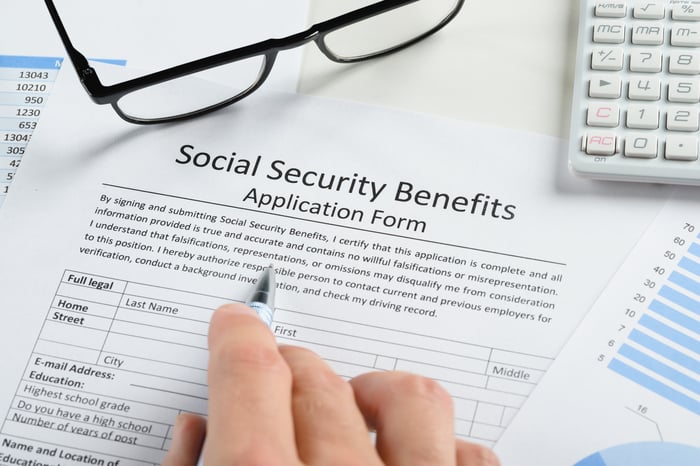Today, more than three out of every five retired workers receiving a benefit from Social Security lean on that payout to account for at least half of their monthly income. Aside from being overly reliant on Social Security, what this data point from the Social Security Administration (SSA) shows is that there's no decision more important to seniors than deciding when to take their benefits.
The 411 on how the Social Security Administration calculates your benefit
Generally speaking, there are four major components that determine your monthly benefit at full retirement age (i.e., the age where you become eligible to receive 100% of your monthly payout). The first two -- your work history and earnings history -- are inextricably linked.
When determining your monthly benefit, the SSA will account for your 35 highest-earning, inflation-adjusted years. Or in simpler terms, you'll want to work at least 35 years and make as much as you can in those years (up to the maximum taxable earnings cap), in order to boost your eventual payout. If you work fewer than 35 years, you'll receive a zero ($0) for income earned in each of those years, and that will be averaged into your monthly benefit calculation.

Image source: Getty Images.
The third factor is your birth year, which is what helps determine your full retirement age. Baby boomers will have a full retirement age of 66, 67, or somewhere in-between, while all future generations of retirees born in or after 1960 will have a full retirement age of 67. If you decide to begin taking benefits at any point prior to your full retirement age, your monthly payout will be permanently reduced. Conversely, waiting until after your full retirement age can lift your monthly stipend above 100%.
The fourth and final factor is your claiming age. Benefits can begin at age 62 or any point thereafter, and there's an incentive to wait. For each year you hold off on taking benefits, your payout grows by approximately 8%, up until age 70. This means, all things being equal (work history, earnings history, and birth year), a person claiming at age 70 could net 76% more per month than an individual claiming as early as possible at age 62.
A crash course on claiming Social Security
Of course, maximizing your lifetime benefits, not necessarily your monthly benefits, is what truly matters. With this being said, before you take Social Security benefits, here are four questions you'll want to ask yourself.

Image source: Getty Images.
1. Am I healthy?
To begin with, you'll want to ask yourself, "Am I healthy?" Although none of us knows our expiration date with any certainty (thankfully!), we can take clues from our own health history and that of our immediate family members to paint a picture of what might lie ahead.
For instance, if you have one or more chronic diseases, such as diabetes or heart disease, the odds would seemingly be in your favor to claim your benefit check earlier rather than later. Though waiting will net a higher monthly benefit, it also means forgoing years without any income from the program. The inflection point for Social Security -- i.e., where total benefits received becomes equal, regardless of the age you claimed benefits -- tends to be between ages 78 and 80. Thus, if you don't believe you'll hit this age range, you'll be better off claiming your payout earlier rather than later.
Comparatively, if your parents have longevity on their side and you've been given a clean bill of health by your doctor, holding off could lead to a much larger monthly and lifetime benefit.

Image source: Getty Images.
2. Is there anyone else my claiming decision could impact?
There's no doubt that deciding when to take your Social Security benefit is a major personal decision. But in some instances, it may not be a decision that impacts only you. Before taking your payout, ask yourself, "Is there anyone else my claiming decision could impact?"
If you're a single individual with no young children, then your claiming decision is truly your own. But if you're married, your claiming decision could financially affect your spouse. If you were to begin taking benefits prior to reaching your full retirement age and you happen to be the household breadwinner, your spouse won't be able to maximize his or her survivor benefit if you pass away first. Conversely, waiting until at least your full retirement age to begin your payouts will ensure that your spouse has the option of maximizing their survivor benefit if you pass away.

Image source: Getty Images.
3. Do I really need the money right now?
A third question you should ask yourself before claiming your Social Security payout is, "Do I really need the money right now?" While the prospect of adding guaranteed monthly income is bound to make some folks wide-eyed, there are longer-term implications that should be accounted for.
As an example, baby boomers with little or nothing saved for retirement might be tempted to claim benefits early in order to have two sources of income (i.e., working wages and their monthly benefit). The concern with this scenario is twofold.
First, the SSA can withhold some or all benefits for recipients who've yet to reach full retirement age and are earning more than $17,640 a year (as of 2019). This would offset any opportunity of double-dipping with two income streams. And secondly, if you'll be counting on Social Security as a major source of income during retirement, you'd want to maximize your monthly payout, not minimize it by claiming early.
On the other hand, if you've been let go by your employer and have no other sources of income, then taking your Social Security benefit, even early, might be the only prudent course of action.

Image source: Getty Images.
4. Do I understand the tax implications?
Lastly, ask yourself, "Do I really understand the tax implications of taking my Social Security benefit?"
Whether you realize it or not, you're more likely than not to owe some federal tax on your Social Security benefit when you retire. An analysis from The Senior Citizens League estimates that 51% of senior households receiving benefits will owe tax on those benefits this year. Single taxpayers whose modified adjusted gross income plus one-half of their benefits exceeds $25,000, and married couples filing jointly in excess of $32,000, will be taxed on a portion of their benefits.
Likewise, 13 states also tax Social Security benefits to some varied degree. Missouri, Rhode Island, and Kansas, for instance, have high individual exemptions of $85,000, $80,000, and $75,000, respectively, meaning few folks will actually be subjected to state-level tax on their benefits. Meanwhile, Vermont, West Virginia, and North Dakota mirror the federal tax schedule, meaning it's easy to become a victim of double taxation in these states.
Understanding your tax implications is important before taking your benefit.




